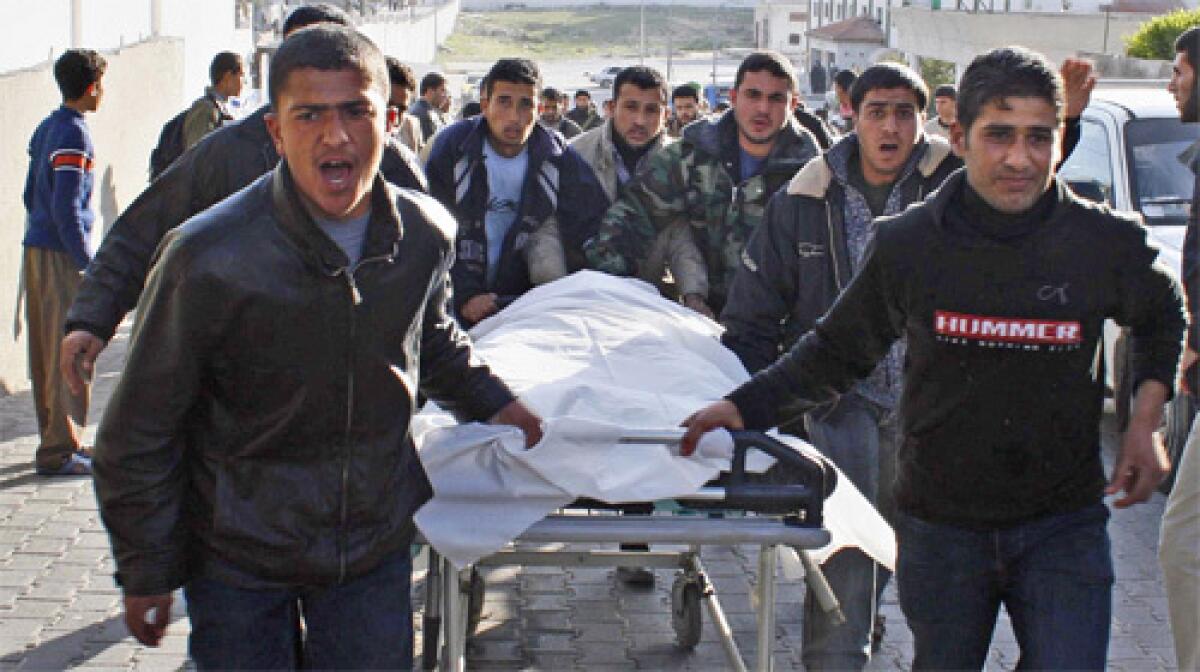Israel kills 9 militants in Gaza

- Share via
JERUSALEM — Israeli attacks killed nine Hamas militants in the Gaza Strip on Tuesday after the Islamic group claimed responsibility for its first suicide bombing in Israel in more than three years.
Hamas’ statement of “full responsibility” for the bombing Monday in the southern desert town of Dimona, which killed a 73-year-old Israeli woman, and the deadly Israeli response raised the likelihood of escalating conflict in the days ahead.
Seven of the militants were killed in an airstrike on a police station near Khan Yunis in the southern Gaza Strip. The two others were shot by Israeli soldiers near Gaza’s southern border with Egypt. Hamas officials said policemen were holding afternoon prayers at the station when the building exploded.
Hamas retaliated by firing more than 10 rockets into southern Israel, striking a house in the town of Sderot and seriously wounding one resident. Electric power was knocked out in part of the town.
The militant group had not carried out a suicide attack in Israel since late 2004. In early 2005, it accepted Palestinian Authority President Mahmoud Abbas’ call for a cease-fire with Israel and agreed to take part in Palestinian parliamentary elections that were held a year later.
But Hamas never stopped fighting Israel and eventually turned against Abbas. It won control of the parliament and, after a short-lived power-sharing arrangement with Abbas’ Fatah movement, violently seized control of Gaza last June.
While Abbas has engaged Israel in peace talks, Hamas has allowed the coastal enclave to be used as a launch pad for near-daily rocket attacks against Israel. Hamas’ military wing, the Izzidin al-Qassam Brigade, has been under grass-roots pressure in Gaza to retaliate more forcefully for Israel’s economic blockade of the territory.
The claim of responsibility for Monday’s bombing came in a statement from the brigade, which said two of its members “brought a nightmare” to Dimona to demonstrate its “ability to strike at the enemy in sensitive areas and at the place it chooses.”
“The siege the Zionists impose on our people will bring more explosions and operations not known to the enemy,” the statement said.
It identified the assailants as Mohammed Harbawi and Shadi Zeghir and said they had reached Dimona from their home city of Hebron in the southern West Bank. Relatives of both men said the pair had served time in Israeli prisons.
One of the attackers blew himself up outside a row of shops in Dimona. The other, wounded in the blast, was shot by a police officer before the militant could ignite his explosives-laden belt. Ten Israelis were wounded.
After the blast, Israeli security officials said they were investigating a different claim, by the armed wing of Fatah, that one of its members and another militant had traveled past Gaza’s recently demolished border wall into Egypt and then slipped into Israel across an unfenced desert border to carry out the Dimona attack.
But on Tuesday the Israelis appeared to accept the Hamas claim.
“Most likely . . . the terrorists didn’t come from the border with Egypt, but most likely they came from the area of Mt. Hebron,” Zeev Boim, an Israeli Cabinet minister, told Israel Radio.
The area around Hebron and nearby Mt. Hebron is not yet sealed off by the barrier Israel is building to separate its territory and West Bank settlements from the bulk of the West Bank and keep out attackers.
The Hamas statement prompted a leading member of Israel’s parliament, Tzachi Hanegbi, to call for a return to the Israeli practice of targeting Hamas political leaders for assassination.
Hanegbi, a senior member of Israeli Prime Minister Ehud Olmert’s centrist Kadima party, told Israel Radio that the targeted killings of two Hamas leaders, Ahmed Yassin and Abdulaziz Rantisi, in the Gaza Strip in 2004 had a “direct effect on the motivation of the Hamas leadership” to halt suicide attacks.
Officials of Hamas, anticipating a resumption of such Israeli strikes, ordered the militant group’s activists to turn off their cellphones, which could be tracked by Israeli drones that routinely fly over Gaza.
Israel heightened its terrorism alert, deploying additional police Tuesday at entrances to cities, shopping malls and bus and train stations. Police said they arrested 240 Palestinians who had entered Israel illegally late Monday and early Tuesday to work.
Special correspondent Rushdi abu Alouf in Gaza City contributed to this report.
More to Read
Sign up for Essential California
The most important California stories and recommendations in your inbox every morning.
You may occasionally receive promotional content from the Los Angeles Times.













